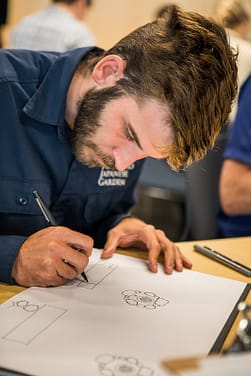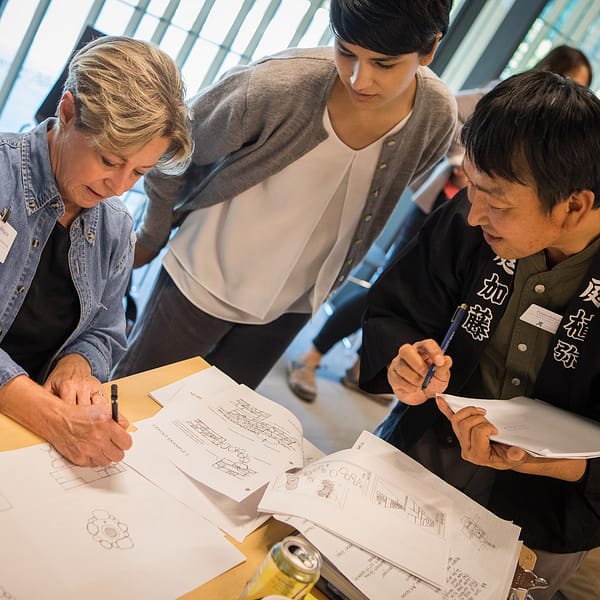It’s early in the year, but we are well into the planning for our 2018 “Waza to Kokoro: Hands and Heart” seminars. This marks the first year that we’ll host both beginner- and intermediate-level seminars in the Japanese garden arts.
Found in Translation: Learning Japanese Garden Arts Outside of Japan
Applications for "Waza to Kokoro: Hands and Heart" Due Soon
The application deadline for the “Waza to Kokoro: Hands and Heart” training seminar is weeks away! Join us to learn Japanese garden arts in an immersive, hands-on environment with visiting instructors from Japan and Garden staff.
Applications for the intermediate level (July 19-30) are due February 28, and applications for the beginner level (Sept. 20-27) are due March 31.
Learn More or Apply

The seminar is an immersive educational experience embracing both the technical and the philosophical. For part of the time, participants work directly in small teams with visiting Japanese garden masters in a hands-on stone setting workshop that also includes bamboo fence construction and some planting design, plus a daylong pruning workshop. This element means learning the art of the garden in the traditional Japanese way: carefully and quietly watching a master at work, and practicing the skills and techniques until they begin to feel intuitive. That experience is complemented by lectures about Japanese garden history and aesthetics, practice with drawing and design, a short clinic to help develop a solid approach to problem-solving in the garden, and practice using and caring for traditional tools. All of this is eloquently framed by the culture of tea and its four principles of wa, kei, sei, jaku (harmony, respect, purity and tranquility).
Peter Putnicki, who took part in the 2016 seminar, described how it changed his professional perspective.
“I learned a lot about the tea ceremony, the impact it has on the aesthetics and history of Japanese Gardens, and also some very useful technical skills for setting, selecting and understanding stone in the Garden,” said Putnicki, Senior Gardener at the Seattle Japanese Garden. “My goals were definitely exceeded.”

Such an intensive learning experience about Japanese gardens taking place outside of Japan raises questions about authenticity and adaptation. How should this graceful tradition be taught and interpreted for non-Japanese environments in a way that learners can take home with them and make their own? In other words, how can it be — to reverse the cliché — found in translation?
Takeshi Kato, a gifted garden craftsman from the Kyoto firm Ueyakato who has served as an instructor in the seminar, made a thoughtful observation on the topic during his time in Portland. It’s not an orthodox devotion to transplanting every detail unchanged, but rather, having the proper mindset and focusing on how the garden evolves over time.
In looking at Japanese gardens outside of Japan, he said, “just because the trees are not from Japan, that doesn’t mean that the authenticity and the taste of the Japanese garden are compromised,” he noted. “Understanding and thinking like a Japanese gardener, practicing the composition of Japanese garden design, applying the practice, and then the consistent fostering of the garden is what keeps the authenticity of the garden.”
This year’s seminar schedule
Intermediate-level: July 19-30 (Application due Feb. 28)
Beginner-level: Sept. 20-27 (Application due March 31)
“Waza to Kokoro: Hands and Heart” is presented by the International Japanese Garden Training Center, which is supported by the Japan Foundation Center for Global Partnership.
The seminars take place at the Garden and at offsite venues, with visiting instructors from Japan, Garden staff, and local visiting lecturers. Seminar application is open to professionals at public gardens as well as to landscape design and construction professionals and students. Significant scholarships are available to public garden professionals, with smaller scholarships available as well to other professionals and students. The course is eligible for professional development or continuing education credits with several professional associations.
–Kristin Faurest, Ph.D., Director, International Japanese Garden Training Center
